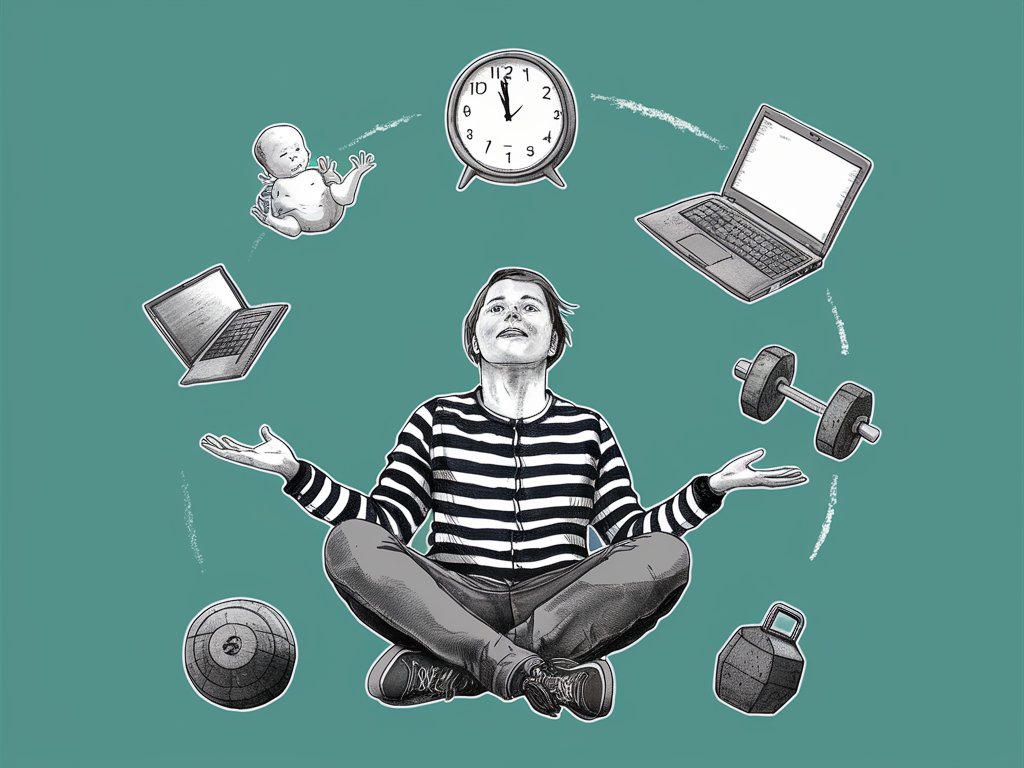In our fast-paced world, finding a balance between work and personal life can seem like a distant dream. With work demands, social obligations, and personal goals all vying for our attention, it’s easy to feel overwhelmed.
But improving your work-life balance is not just about managing your time; it’s about finding harmony between your responsibilities and your well-being.
Today, I want to share practical steps you can take to improve your work-life balance, so you can enjoy a more fulfilling life both at work and at home.
What is Work-Life Balance?
Work-life balance is a term we hear often, but what does it really mean? At its core, work-life balance refers to the equilibrium that exists between your professional responsibilities and your personal life.
It’s about allocating your time and energy in a way that allows you to fulfill your work duties while also enjoying your personal interests, spending time with loved ones, and taking care of yourself.
Balance doesn’t mean equal time for everything; it’s about making intentional choices that reflect your values and priorities.
In today’s digital age, the lines between work and personal life can become blurred, especially with remote work becoming more common.
Many of us find ourselves answering work emails late at night or working on weekends, which can lead to burnout and stress.
Achieving a good work-life balance requires being mindful of how you spend your time and setting clear boundaries between your work and personal life.
It’s about being present in whatever you’re doing, whether that’s working on a project or enjoying a meal with your family.

How Can You Improve Work-Life Balance?
Before we dive into the specific strategies, it’s important to understand that improving your work-life balance is an ongoing process. It’s not something you can achieve overnight, and it will look different for everyone.
It’s acceptable if something that works for one individual doesn’t work for another. The key is to find what works best for you and to be flexible as your circumstances change.
Let’s explore some practical steps you can take to start improving your work-life balance today.

1. Accept That There Is No ‘Perfect’ Work-Life Balance
One of the biggest misconceptions about work-life balance is that there’s a perfect formula you can follow to achieve it. The truth is, there is no perfect balance. Life is unpredictable, and your priorities will shift over time.
There will be days when work takes up more of your time, and there will be days when your personal life needs more attention. Instead of striving for a perfect balance, aim for flexibility and adaptability.
It’s important to recognize that work-life balance is not a one-size-fits-all concept. It’s acceptable if something that works for one individual doesn’t work for another.
The key is to find a balance that feels right for you, one that allows you to fulfill your responsibilities while also enjoying your life.
This might mean setting aside specific times for work and personal activities, or it might mean being more flexible with your schedule.
The most important thing is to be kind to yourself and accept that balance is a journey, not a destination.

2. Find a Job That You Love
One of the most significant factors in achieving a healthy work-life balance is having a job that you love.
When you’re passionate about what you do, work doesn’t feel like a burden, and you’re more likely to find joy in your daily tasks.
However, this doesn’t mean that every day will be perfect or that you’ll always be motivated. There will still be challenges, but when you love what you do, those challenges become easier to overcome.
If you’re not happy in your current job, it might be time to consider a change. This doesn’t necessarily mean quitting your job and starting over; it could mean finding ways to make your current job more fulfilling.
Maybe it’s taking on a new project that excites you, learning a new skill, or finding ways to align your work with your passions.
Remember, your job is a significant part of your life, and it’s important to find something that makes you feel fulfilled.
3. Prioritize Your Health
Your health is your most valuable asset, and it should always be a priority. Without good health, it’s impossible to enjoy your work or your personal life fully.
Prioritizing your health means making time for regular exercise, eating a balanced diet, getting enough sleep, and taking care of your mental well-being.
It also means recognizing when you’re feeling overwhelmed and taking steps to manage stress.
Incorporating healthy habits into your daily routine doesn’t have to be complicated. Start by making small changes, like taking a walk during your lunch break, preparing healthy meals in advance, or practicing mindfulness for a few minutes each day.
The key is consistency; these small habits will add up over time and significantly impact your overall well-being. Recall that caring for oneself is a need, not a luxury.
When you’re healthy, you’re better equipped to handle the demands of work and life.
4. Don’t Be Afraid to Unplug
In our constantly connected world, the idea of unplugging can feel daunting. But taking a break from technology is essential for maintaining a healthy work-life balance.
Constantly checking emails, responding to messages, and staying connected to work even after hours can lead to burnout and reduce your productivity.
Unplugging allows you to recharge, reconnect with yourself and your loved ones, and return to work with renewed energy and focus.
Start by setting boundaries for when and how you use technology. For example, you could designate specific times during the day when you check your emails and avoid using your phone during meals or when spending time with family.
You might also consider taking a digital detox for a day or even a weekend, where you completely disconnect from technology.
It might be challenging at first, but you’ll likely find that it helps you feel more present and less stressed.
5. Take a Vacation
Taking a vacation is not just a luxury; it’s a crucial part of maintaining a healthy work-life balance. Vacations allow you to step away from the demands of work, relax, and recharge.
Whether it’s a week-long trip to a new destination or a simple staycation at home, taking time off from work is essential for your mental and physical health.
When you take a vacation, you give yourself the chance to unwind, explore new experiences, and spend quality time with loved ones. It’s an opportunity to reset, both mentally and physically, so that you can return to work feeling refreshed and motivated.
It’s important to plan your vacations in advance and to fully disconnect from work during this time. That means not checking emails, not thinking about work projects, and fully immersing yourself in the experience of your vacation.
6. Make Time for Yourself and Your Loved Ones
In the hustle and bustle of everyday life, it’s easy to neglect your own needs and the needs of your loved ones. But making time for yourself and those you care about is essential for a healthy work-life balance.
Whether it’s spending a few minutes each day doing something you love, like reading a book or going for a walk, or setting aside time each week for a family dinner or a date night with your partner, these moments are important for your overall well-being.
Making time for yourself doesn’t mean being selfish; it means recognizing that your needs are just as important as your work responsibilities.
It’s about finding ways to recharge your batteries so that you can show up as your best self in all areas of your life.
Similarly, spending quality time with your loved ones helps strengthen your relationships and provides a sense of connection and support.

7. Set Boundaries and Work Hours
Setting boundaries is a crucial part of maintaining a healthy work-life balance. Without clear boundaries, it’s easy for work to spill over into your personal life, leading to stress and burnout.
Setting boundaries means establishing clear limits on when and how you work and sticking to those limits. This could mean setting specific work hours and not checking emails outside of those hours, or it could mean creating a dedicated workspace at home where you can focus on work without distractions.
Setting boundaries also means learning to say no when necessary. It’s easy to take on too much, especially when you’re trying to please others or prove yourself at work.
But saying no is not a sign of weakness; it’s a way of protecting your time and energy. It’s about recognizing that you can’t do everything and that it’s okay to prioritize your well-being over work demands.
8. Set Goals and Priorities (and Stick to Them)
Setting goals and priorities is essential for maintaining a healthy work-life balance. When you have clear goals and priorities, you’re better able to focus your time and energy on what matters most.
This means setting both short-term and long-term goals and regularly reviewing and adjusting them as needed. It also means being intentional about how you spend your time, ensuring that your daily activities align with your goals and priorities.
To set effective goals, start by identifying what’s most important to you, both in your work and personal life. Next, divide those objectives into more manageable, daily-achievable tasks.
The key is to be consistent and to regularly check in with yourself to ensure you’re on track. Remember, setting goals is not just about achieving success; it’s about creating a sense of purpose and direction in your life

How Does a Flexible Workplace Help You Achieve Work-Life Balance?
A flexible workplace can play a significant role in helping you achieve a healthy work-life balance. In a traditional work environment, rigid schedules and strict office hours can make it challenging to manage both professional and personal responsibilities.
However, a flexible workplace allows for more autonomy in how you allocate your time, making it easier to balance work with other aspects of your life.
One of the primary benefits of a flexible workplace is the ability to set your own hours. Whether it’s starting your day earlier or later, or taking breaks when needed, having control over your schedule allows you to work when you’re most productive and manage personal obligations more effectively.
For instance, if you’re a parent, you can adjust your work hours around your child’s school schedule, making it easier to be present for school events or family activities without sacrificing your job responsibilities. Remote work is another aspect of workplace flexibility that can enhance work-life balance.
Working from home eliminates the time spent commuting, which can be redirected toward personal activities like exercise, hobbies, or spending time with loved ones. It also provides the comfort of working in a familiar environment, which can reduce stress and increase productivity.
Flexible workplaces also tend to promote a culture of trust and respect, where employees are evaluated based on their output rather than the number of hours they spend at their desks.
This shift in focus from time to results encourages a healthier work-life balance by allowing employees to prioritize their tasks and manage their time in a way that suits them best.
Additionally, this kind of work environment often leads to higher job satisfaction and employee retention, as workers feel valued and supported in their pursuit of a balanced life.
In summary, a flexible workplace is not just a perk; it’s a vital component of modern work-life balance. It offers the freedom to tailor your work schedule to fit your life, reducing stress and enhancing your overall well-being.
Whether through flexible hours, remote work options, or a results-oriented approach, a flexible workplace can make it much easier to find the balance you need to thrive both professionally and personally.

Why is Work-Life Balance Important?
Understanding the importance of work-life balance is crucial to making it a priority in your life. Work-life balance is more than just a buzzword; it’s an essential aspect of a healthy, fulfilling life.
When you achieve a good balance between your work and personal life, you’re better equipped to handle the demands of both, leading to improved well-being and satisfaction.
Let’s dive into why work-life balance is so important and how it impacts various aspects of your life.
It Impacts Your Mental Health
Maintaining a healthy work-life balance is vital for your mental health. When work dominates your life, it can lead to stress, anxiety, and even depression. Constant pressure to perform, meet deadlines, and juggle multiple tasks can take a toll on your mental well-being.
However, when you have a balance between work and personal time, you’re better able to manage stress and avoid burnout.
Taking time for yourself, engaging in activities you enjoy, and spending time with loved ones are all important for maintaining good mental health.
These activities provide a much-needed break from work and help you recharge, making you more resilient to the challenges that work can bring.
It Impacts Your Physical Health
Work-life balance isn’t just about mental health; it also has a significant impact on your physical health. When work consumes too much of your time, it’s easy to neglect healthy habits like regular exercise, eating well, and getting enough sleep.
Over time, this can lead to physical health issues such as weight gain, high blood pressure, and a weakened immune system.
On the other hand, when you prioritize balance, you’re more likely to make time for activities that support your physical health. Whether it’s going for a run, cooking a nutritious meal, or getting a good night’s sleep, these habits are crucial for maintaining your overall well-being.
A healthy body supports a healthy mind, making it easier to manage both work and personal responsibilities.
It Impacts Your Job Performance
Ironically, working too much can actually harm your job performance. When you’re constantly working without taking breaks or making time for yourself, you’re more likely to experience burnout, which can lead to decreased productivity and creativity.
Over time, this can negatively impact your performance at work, making it harder to achieve your goals and advance in your career.
However, when you maintain a healthy work-life balance, you’re more focused, motivated, and productive. Taking regular breaks and making time for activities you enjoy helps to keep your mind sharp and your energy levels high.
This, in turn, allows you to perform better at work and achieve your professional goals more effectively.
It Impacts Your Relationships
Your relationships are one of the most important aspects of your life, and maintaining a healthy work-life balance is essential for nurturing them. When work consumes too much of your time, it’s easy to neglect the people who matter most to you.
This can lead to strained relationships, feelings of isolation, and a lack of connection with your loved ones.
However, when you prioritize balance, you’re more present and engaged in your relationships. Whether it’s spending quality time with your partner, playing with your kids, or catching up with friends, these moments are important for building strong, healthy relationships.
Maintaining these connections not only improves your personal life but also provides a support system that can help you manage work-related stress.

A Healthy Work-Life Balance Takes Work
Achieving a healthy work-life balance doesn’t happen overnight, and it’s not something you can achieve once and forget about. It takes continuous effort, self-awareness, and a willingness to make changes as your circumstances evolve.
But the benefits are well worth the effort. When you take the time to prioritize your well-being, set boundaries, and make intentional choices, you’ll find that you’re not only happier and healthier but also more fulfilled in all areas of your life.
Remember, balance looks different for everyone, and there’s no one-size-fits-all solution. What matters most is finding what works best for you and being flexible as your needs change.
With patience, persistence, and a commitment to your well-being, you can achieve a work-life balance that allows you to thrive both personally and professionally.
Personal Story
I’ve always been someone who values hard work, and for a long time, I believed that the key to success was putting in as many hours as possible. I’d often find myself working late into the night, skipping meals, and sacrificing time with my family to meet deadlines.
But after a while, I started to notice the toll it was taking on my health and happiness. I was constantly stressed, exhausted, and felt disconnected from the people I cared about most.
At that point, I understood something had to change. I started making small adjustments, like setting strict work hours, taking regular breaks, and making time for the things I love.
It wasn’t easy at first, but over time, I noticed a significant improvement in my well-being. I was happier, healthier, and felt more fulfilled in both my work and personal life.
It’s an ongoing process, but I’ve learned that work-life balance is not about doing it all perfectly; it’s about making choices that align with your values and priorities.

FAQs About Work-Life Balance
How can I start improving my work-life balance today?
Start by setting clear boundaries between work and personal time, prioritizing your health, and making time for activities that bring you joy. Remember, work-life balance is a journey, and it’s okay to make small changes over time.
What if my job doesn’t offer flexible work options?
Even if your job doesn’t offer flexibility, you can still take steps to improve your work-life balance. This might include setting strict work hours, taking breaks during the day, and finding ways to disconnect from work outside of office hours.
Can work-life balance improve my job performance?
Yes! Maintaining a healthy work-life balance can actually enhance your job performance by reducing stress, increasing focus, and boosting creativity. When you’re well-rested and happy, you’re better equipped to excel at work.
Why is work-life balance important for my relationships?
A healthy work-life balance allows you to be more present and engaged in your relationships, which is crucial for building strong connections with loved ones. Prioritizing time with family and friends can lead to happier, healthier relationships.
Is it okay to say no at work?
Absolutely! Saying no is an important part of setting boundaries and protecting your time and energy. It’s okay to prioritize your well-being over work demands, and saying no when necessary can help you maintain a healthier work-life balance.
Key Takeaways
- Work-life balance is about creating harmony between your professional and personal life.
- There is no perfect balance; it’s about finding what works best for you.
- Prioritizing your health, setting boundaries, and making time for yourself are crucial.
- A flexible workplace can significantly improve your work-life balance.
- A healthy work-life balance positively impacts mental health, physical health, job performance, and relationships.
In conclusion, improving your work-life balance is about making intentional choices that support your well-being.
It’s a continuous process that requires self-awareness, flexibility, and a commitment to living a fulfilling life both at work and at home.
By following the steps outlined in this blog post, you can start making positive changes today that will lead to a healthier, happier you.




